Every foreign visitor is interested in this topic, because we have a very bad reputation in connection of Gypsies all over the world. I try to tell you the story of the Hungarian Roma people with my own words, because you can hardly find written documents in this topic. Why? I would like to explain it. Notice: The Roma and the Gipsy/Gypsy words have the same meaning in Hungary, I will use them alternately. But it is more difficult to find a name for those people, who are not Gypsy/Roma. These people are the majority of the whole society, I will call them “Hungarians”.
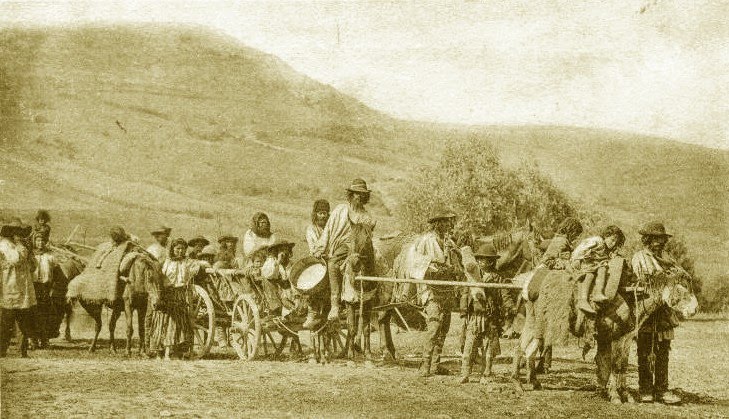
Wandering Gypsies somewhere on the countryside in the 19th century
The Gypsies appeared in Hungary in the area of the recent Slovakia first in the 14th century. According to the historical sources they came from the Middle East, from India. Later Gypsies spread in the whole country and they got protection from King Luxemburgi Zsigmond (Sigismund of Luxembourg), so they could wander and live without any restriction in the area of the former Hungarian Kingdom. A part of them moved on towards Western Europe, but the free wandering was forbidden for the Roma people in those countries, so they came back after a while and stayed in Hungary. This is the explanation of the big number of the Gypsies in the area of the former Hungary (recent Hungary, Slovakia, eastern part of Ukraine, Romania, northern part of Serbia). Although the Habsburgs - Queen Mária Terézia (Maria Theresa) and II. József (Joseph II.) tried to settle the Gypsies in the 18th century, they kept their freedom partly until the 20th century. But slowly Gypsy plants were built up at the borders of the settlements. After the World War 1 the government prohibited the free wandering of Roma people, but my mother still saw Gypsy caravans to travel through her village in the vicinity of Budapest in the 1930s. Unfortunately they didn’t have any organised job, they tried to live from different works: they bought and sold horses on the market, they made baskets and wooden tubs, they were the blacksmiths, etc.
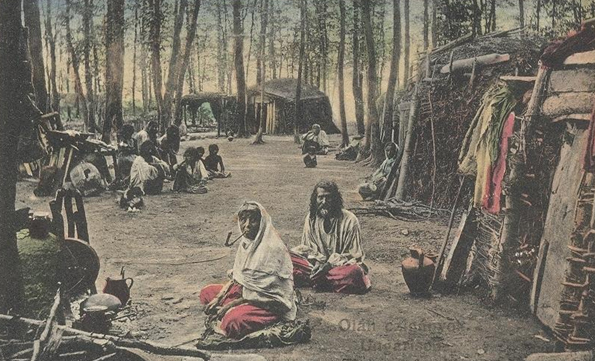
Gipsy camp in the forest in the 19th century
But there was a big change after the World War 2. The work was a compulsory thing in the socialistic system; the law punished unemployed people. The Roma people went in the factories and did the simplest jobs, which didn’t need much knowledge, or they stayed in villages and worked in farmers’ co-operatives. The ugly Roma quarters began to disappear, the education was almost complete in the elementary schools. Gypsies had permanent earning from their work and they got support to upbringing their children: family allowance – as every other Hungarian family. It seemed, the situation of Gypsies got better, but the system change came at the end of the 1980s.
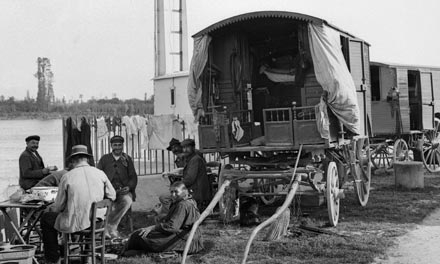
Gipsy coach in the 1920's
The uneconomic factories were closed, the farmers’ co-operatives disappeared because of the division of arable lands. The big towns in the vicinity of Cserehát Hills: Miskolc, Diósgyőr and Ózd had big steel and iron factories, all of their workers became unemployed in the 1990s. The better educated „Hungarian” people moved to another places to find a new job, but Gypsies stayed there. The change of the population began in that time: the cheap houses were bought by Roma people, the rest of „Hungarian” people escaped from the settlements. Only the old pensioners left in those villages.

THE GIPSIES IN THE PERCENTAGE OF THE WHOLE POPULATION IN 1987 WITH THE ROUTE OF BLUE TRAIL
If you click onto the map, it will open in bigger size.
I have found a map in the secondary school's geographical map collection of my daughter about the population of the Roma people in the percentage of the whole population of Hungary before the regime change. The survey happened between 1984 and 1987, as you can see on the left-bottom side of the map. I put the route of the Blue Trail onto this map.
Although my daughter studied after the regime change, this map was forgotten in the collection (explanation later)! The percentage of the Roma population was the biggest in the Cserehát (north-eastern region) and in the Baranya region (south-western region). The situation have gotten worse since that time because of the change of population. The Blue Trail goes across the Cserehát region, but avoids Baranya county, as you can see on the map.
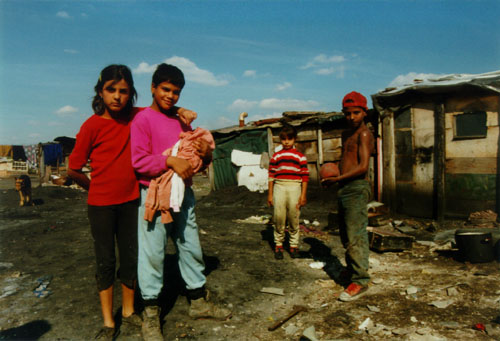
Gypsies in Hungary - Present situation 1.
The mentioned movement of the Roma people became a real deadlock: now they don’t have any earning in the small settlements, so they cannot escape from this situation! Nevertheless they could find a half-solution: this is the family allowance, which is about 13.000 HUF (about 40 Euro) for every child! The solution is to reproduce yourself! Girls begin to bear in very young age: usually a 15-16 years old “woman” already has children, and the number of the children is very high (4-6) in the families. A real population explosion happened in the Gypsie society in the past almost 30 years!
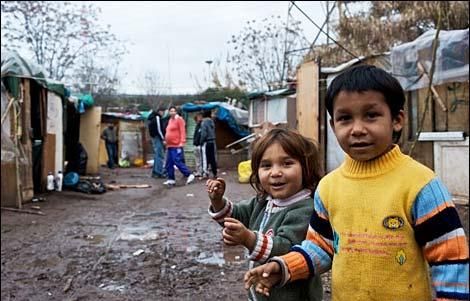
Gypsies in Hungary - Present situation 2.
But this is the biggest dead-end for the Gypsies and the Hungarian state, as well! Roma people cannot understand that on the one hand the support is bigger if women bear more children, but on the other hand the earning is the same few Forints at every child! The amount of the monetary support with the dole (aid for unemployed people) is always bigger and bigger, and it will reach that limit soon, what the government – or the whole Hungarian nation – do not able to pay! Unfortunately the crisis of the world economic in 2008 made more serious situation! Many thousands of working people had lost their job and needed dole, as well! It is fact, Hungary had the lowest percentage of working people among the whole population in the European Union in that time: it was hardly 30%!
At present the most part of Roma people live in the deepest destitution, and I see, there is hardly any possibility to escape from this situation! The Gypsies have to eat up everything in their environs because of the lack of appropriate earnings, they cut and fire the trees of the forests, destroy the empty houses of the settlements - these are the former houses of the escaped “Hungarian” people -, and try to sell every valuable thing of them. The wealthy Roma people borrow money with very high interest for the poor ones, they have to pay it back from the few family support, and unfortunately the delinquency spreads more and more among the Gypsies.
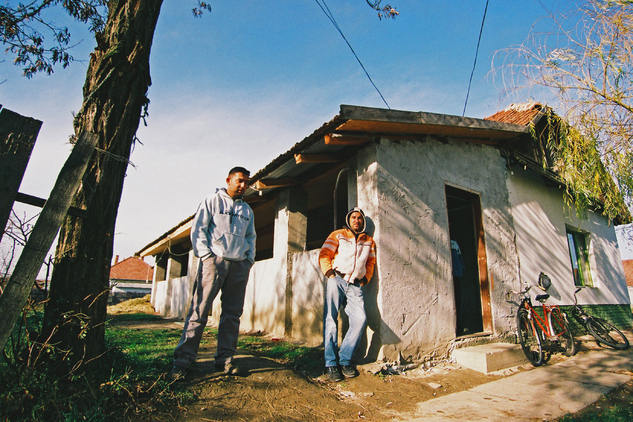
Gypsies in Hungary - Present situation 3.
A new idea was born at the 1990’s: the “subsistence criminality”! This concept is linked to Mr. Gábor Kuncze, to the former liberal minister of interior affairs. It is exactly the opposite of the “zero tolerance”, because the subsistence criminality means, we have to be indulgent with the Roma people, if they steal cheap things, because it is necessary for their everyday life!
These things are very well-known in Hungary, but we take the “democracy” in the wrong sense and a lot of people believe that we would harm the human rights, if we took difference between people and we say: there are Roma and not Roma people. Doesn’t exist any statistic about the exact number of Roma people, about the Roma delinquency, because we must not take any difference among people! This is the effort of the so-called “political correctness” or in short: PC. But we can see, there are whole counties in Hungary, where only they live (manly in Cserehát Hills and Baranya Region) and this situation is a really Catch-22! The situation is similar in other regions of Hungary, as well, but they aren’t in majority on those places, only in the mentioned parts of the country.
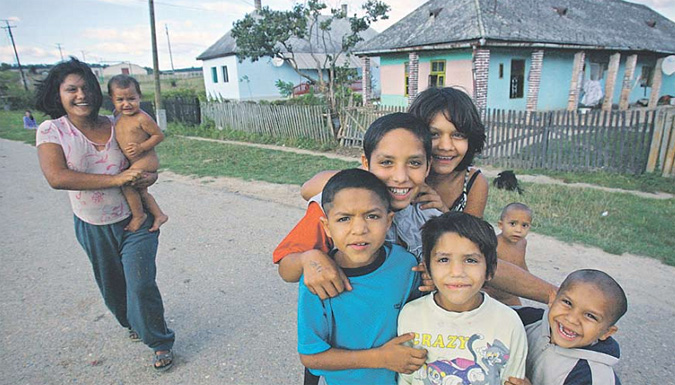
Gypsies in Hungary - Present situation 4.
Hungarian people feel that we are not able to keep almost one million unemployed Roma and see, that the delinquency gets bigger and bigger among them. Their sin is small: they steal the food and the money which is necessary to their life, but the society cannot accept the behaviour of Roma people, and the tolerance is always smaller. Gypsies steal from their “Hungarian” neighbours in the mixed villages, and the Police is powerless against the million tiny stealing and against the growing number of serious crimes, too. But one thing is sure: Gypsies do not condemn those members of the Roma society, who steal for his own subsistence from the “Hungarians”. The Magyar Gárda – Hungarian Guards – was founded by right-sided people to protect the society from the “Roma Risk”, and although it is out of law already, it has a lot of follower.
Of course, Roma people feel the danger, as well, some of them tried to move abroad, to ask for political asylum in different countries, for example in Sweden or in Canada, and a few families travelled in Strasburg some years ago. Unfortunately these countries do not keep open house for Roma people, because they saw, refugees didn’t study the language, didn’t want to work, they wanted only dole and home. In some cases they restored the visa system against the Hungarian and Slovak people to stop the migration of Gypsies into the countries, or the French government sent the Roma people back in their mother countries.
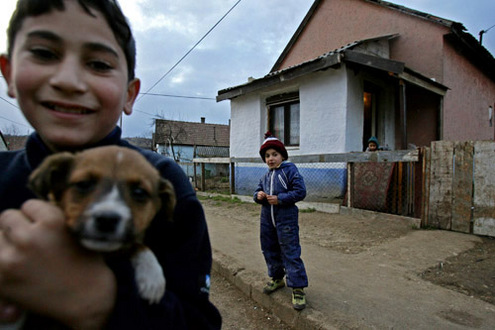
Gypsies in Hungary - Present situation 5.
I think these are the last seconds of the 24th hour! One thing is sure: we have to do something, because the whole society will crash down! The one and only solution is to lift up again the Roma people and give them permanent work. But during the last 30 years almost two Roma generations grown up without any work, and they think it is a natural thing to get dole without any work! The working society can see, that Gipsies feel pretty well in this situation and don’t want to change anything! It will be very a very hard, expensive and long procedure!
The Hungarian government launched the public work for the unemployed people in 2011, mainly in the countryside of Hungary, where the Roma population live. People, who are employed in the public work system keep the order in the villages, clean the streets or maintain the public utilities. Local governments organizes the work, unfortunately they can't employ every unemployed people, only a few months in a year because the lack of money.
The second thing is on the one hand to decrease the number of children in the very poor (Roma) families, on the second hand to increase the number of children in the whealthy families, because the statistics show, the population is decreasing and gets older and older in the country. The government launched a new family support system in 2012, it keeps the sum of the family allowance (13.000 HUF) and the inflation decreases its value continuously, but families with multiple children get besides the family allowance a significant tax discount, too. It means, working parents of minimum three children don't pay personal income tax! The results are already visible, “Hungarian” families undertake more children in the last few years and the number of newborn Gypsy children perhaps decreases very slowly.
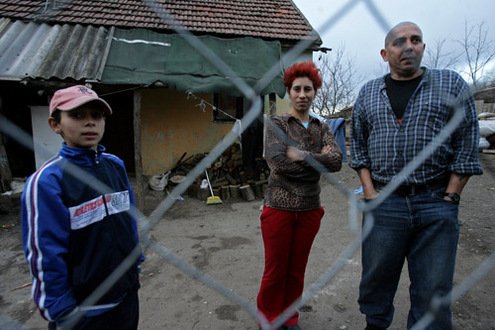
Gypsies in Hungary - Present situation 6.
The second breakout point is perhaps the education. Unfortunately Roma children can see in the family that they are able to live from the dole, the work is not an important thing. They can see that they can avoid the punishment for the subsistence criminality. The lack of motivation in the study determines their destiny: if they don’t learn, won’t have job, they will be unemployed people. They will live from the doles, and the big circle begins again!
The right-sided party named “Jobbik” has got more than 12% place in the new Hungarian Parliament on the election in 2010 and 2014. It shows that a big part of Hungarian people is waiting for strong change, and not important if that change will be hard or bloody against the Gypsies!
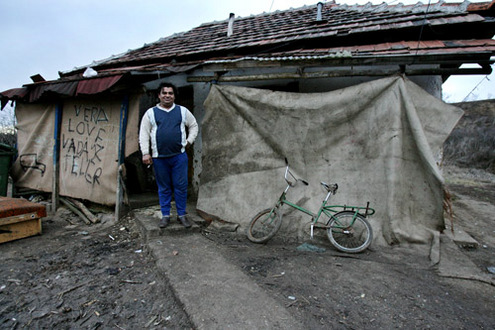
Gypsies in Hungary - Present situation 7.
The Roma culture is totally different from ours, many times I do not understand their attitude, although I lived here my whole life. Generally they do not keep order in the gardens around their houses, they live their society life on the streets, they are much louder, than other people, but it is only the surface of the great sea of differences. But after all a lot of Roma people are honest, I hiked many times among them, and until this time they stole nothing from me, I didn’t have any problem with them. The Hungarian hikers have different forums on the Internet, where we chat a lot with each other, the news spread very fast there, but nobody from the hikers have suffered any harm from the Roma people in their villages!
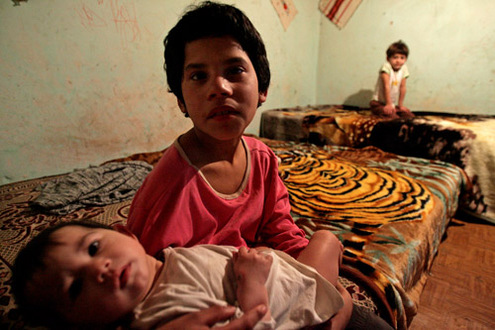
Gypsies in Hungary - Present situation 8.
When my son and I walked on the Blue Trail in the Cserehát Hills, we had accommodation in Rakacaszend village in the kindergarten, In Felsővadász village in the gym of the school and Encs in a guest house. We did not have any problem or conflict with the Roma people. They answered gladly when we asked for information, we sat together with them in the pubs, and we walked among them through the Cserehát! I think there is not any risk to travel through the Cserehát for foreign people, and the situation is the same with the accommodations! I can give only one advice: don’t show your values (mobile phone, GPS, expensive cameras, jewels, etc.) because there is a Hungarian saying: Devil never sleeps!
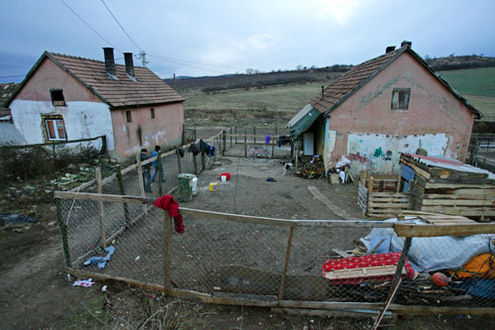
Gypsies in Hungary - Present situation 9.
Finally I have to tell you honestly again, this long article is only the opinion of mine and my hiker friends, and not the official point of view – because the official point says: There is not any Gypsy problem in Hungary. The reasons were mentioned above. If you are interested in this topic, I would like to recommend you a longer article, which was published in 2010 about the Roma problem, before the elections.
This was a little bit long chapter, but I hope, you understand better the Hungarian reality now! If you are interested in this topic read this, already mentioned stuff:
The re-evaluation of the Roma policy in Hungary
This article was on the already closed http://www.budapestanalyses.hu/ website in 2010, fortunately I downloaded it. I selected the photos about roma people from an article of the well known Hungarian photogapher, Mr. Ákos Stiller. I think these photos are the best to introduce the unimgaginable powerty and the closed world of gypsies.
| The name of the hosting provider: | Port Kft. |
| The postal address of the hosting provider: | 9200 Mosonmagyaróvár, Szent István király út 60. |
| E-mail address of the hosting provider: | info@webtar.hu |
| The name of the author and editor of the website: | Horváth Béla |
| E-mail address of the author and editor: | horvabe1959@gmail.com |
| The information on this website is true and complete to the best of the author's knowledge. All recommendations are made without guarantee on the part of the author. The author disclaims any liability in connection with the use of this information. | |
 Creative Commons license: Attribution-NonCommercial-NoDerivatives 4.0 International Creative Commons license: Attribution-NonCommercial-NoDerivatives 4.0 International | |
| Please read the Cookie Policy of this website! It contains important information! | |
